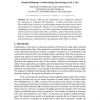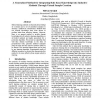1134 search results - page 13 / 227 » Sequential Inductive Learning |
ENTCS
2008
15 years 2 months ago
2008
We present a Hoare-style specification and verification approach for invariants in sequential OO programs. It allows invariants over nonhierarchical object structures, in which upd...
IPL
2006
15 years 2 months ago
2006
We present a Coq-formalised proof that all non-cooperative, sequential games have a Nash equilibrium point. Our proof methodology follows the style advocated by LCFstyle theorem p...
144
click to vote
CORR
2011
Springer
14 years 9 months ago
2011
Springer
Hybrid learning methods use theoretical knowledge of a domain and a set of classified examples to develop a method for classification. Methods that use domain knowledge have been ...
127
Voted
ILP
2007
Springer
15 years 8 months ago
2007
Springer
In reinforcement learning problems, an agent has the task of learning a good or optimal strategy from interaction with his environment. At the start of the learning task, the agent...
109
click to vote
ATAL
2005
Springer
15 years 7 months ago
2005
Springer
In contrast to classical game theoretic analysis of simultaneous and sequential play in bimatrix games, Steven Brams has proposed an alternative framework called the Theory of Mov...


